Also by Andrew Bacevich
The Long War:
A New History of U.S. National Security Policy
Since World War II
The New American Militarism:
How Americans Are Seduced by War
American Empire:
The Realities and Consequences of U.S. Diplomacy
The Imperial Tense:
Prospects and Problems of American Empire
THE LIMITS
OF POWER
The End of American Exceptionalism
Andrew J. Bacevich
Metropolitan Books
Henry Holt and Company
New York
Set thine house in order.
2 Kings, chapter 20, verse 1

Holt Paperbacks
Henry Holt and Company, LLC
Publishers since 1866
175 Fifth Avenue
New York, New York 10010
www.henryholt.com
A Holt Paperback and  are registered trademarks
are registered trademarks
of Henry Holt and Company, LLC.
Copyright 2008 by Andrew J. Bacevich
Afterword 2009 by Andrew J. Bacevich
All rights reserved.
Distributed in Canada by H. B. Fenn and Company Ltd.
Library of Congress Cataloging-in-Publication data
Bacevich, A. J.
The limits of power / Andrew J. Bacevich.1st ed.
p. cm.
Includes bibliographical references and index.
ISBN-13: 978-0-8050-9016-1
ISBN-10: 0-8050-9016-9
1. United StatesPolitics and government19932001. 2. United StatesPolitics and government2001 3. Power (Social sciences)United States. I. Title.
JK271.B24 2008 |
320.973dc22 | 2008007040 |
Henry Holt books are available for special promotions and premiums.
For details contact: Director, Special Markets.
Originally published in hardcover in 2008 by Metropolitan Books
First Holt Paperbacks Edition 2009
Designed by Meryl Sussman Levavi
Printed in the United States of America
1 3 5 7 9 10 8 6 4 2
To the memory of my beloved son
ANDREW JOHN BACEVICH
First Lieutenant, U.S. Army
July 8, 1979May 13, 2007
Contents
Introduction:
War Without Exits
For the United States, the passing of the Cold War yielded neither a peace dividend nor anything remotely resembling peace. Instead, what was hailed as a historic victory gave way almost immediately to renewed unrest and conflict. By the time the East-West standoff that some historians had termed the Long Peace ended in 1991, the United States had already embarked upon a decade of unprecedented interventionism.
Viewed in retrospect, indications that the Long Peace began almost immediately to give way to conditions antithetical to peace seem blindingly obvious. Prior to 9/11, however, the implications of developments like the 1993 bombing of the World Trade Center or the failure of the U.S. military mission to Somalia that same year were difficult to discern. After all, these small events left unaltered what many took to be the defining reality of the contemporary era: the preeminence of the United States, which seemed beyond challenge.
During the 1990s, at the urging of politicians and pundits, Americans became accustomed to thinking of their country as the indispensable nation. Indispensability carried with it both responsibilities and prerogatives.
The chief responsibility was to preside over a grand project of political-economic convergence and integration commonly referred to as globalization. In point of fact, however, globalization served as a euphemism for soft, or informal, empire. The collapse of the Soviet Union appeared to offer an opportunity to expand and perpetuate that empire, creating something akin to a global Pax Americana.
The indispensable nations chief prerogative, self-assigned, was to establish and enforce the norms governing the postCold War international order. Even in the best of circumstances, imperial policing is a demanding task, requiring not only considerable acumen but also an abundance of determination. The preferred American approach was to rely, whenever possible, on suasion. Yet if pressed, Washington did not hesitate to use force, as its numerous military adventures during the 1990s demonstrated.
Whatever means were employed, the management of empire assumed the existence of bountiful reserves of powereconomic, political, cultural, but above all military. In the immediate aftermath of the Cold War, few questioned that assumption.and unambiguous. This was not hypernationalistic chest-thumping; it was the conventional wisdom.
Recalling how Washington saw the postCold War world and Americas place in (or atop) it helps us understand why policy makers failed to anticipate, deter, or deflect the terrorist attacks of September 11, 2001. A political elite preoccupied with the governance of empire paid little attention to protecting the United States itself. In practical terms, prior to 9/11 the mission of homeland defense was unassigned.
The institution nominally referred to as the Department of Defense didnt actually do defense; it specialized in power projection. In 2001, the Pentagon was prepared for any number of contingencies in the Balkans or Northeast Asia or the Persian Gulf. It was just not prepared to address threats to the nations eastern seaboard. Well-trained and equipped U.S. forces stood ready to defend Seoul or Riyadh; Manhattan was left to fend for itself.
Odd as they may seem, these priorities reflected a core principle of national security policy: When it came to defending vital American interests, asserting control over the imperial periphery took precedance over guarding the nations own perimeter.
After 9/11, the Bush administration affirmed this core principle. Although it cobbled together a new agency to attend to homeland security, the administration also redoubled its efforts to shore up the Pax Americana and charged the Department of Defense with focusing on this task. This meant using any means necessarysuasion where possible, force as requiredto bring the Islamic world into conformity with prescribed American norms. Rather than soft and consensual, the approach to imperial governance became harder and more coercive.
So, for the United States after 9/11, war became a
By and large, Americans were slow to grasp the implications of a global war with no exits and no deadlines. To earlier generations, place names like Iraq and Afghanistan had been synonymous with European rashnessthe sort of obscure and unwelcoming jurisdictions to which overly ambitious kings and slightly mad adventurers might repair to squabble. For the present generation, it has already become part of the natural order of things that GIs should be exerting themselves at great cost to pacify such far-off domains. For the average American tuning in to the nightly news, reports of U.S. casualties incurred in distant lands now seem hardly more out of the ordinary than reports of partisan shenanigans on Capitol Hill or brush fires raging out of control in Southern California.
How exactly did the end of the Long Peace so quickly yield the Long War? Seeing themselves as a peaceful people, Americans remain wedded to the conviction that the conflicts in which they find themselves embroiled are not of their own making. The global war on terror is no exception. Certain of our own benign intentions, we reflexively assign responsibility for war to others, typically malignant Hitler-like figures inexplicably bent on denying us the peace that is our fondest wish.
This book challenges that supposition. It argues that the actions of Saddam Hussein and Osama bin Laden, however malevolent, cannot explain why the United States today finds itself enmeshed in seemingly never-ending conflict. Although critics of U.S. foreign policy, and especially of the Iraq War, have already advanced a variety of alternative explanationsvariously fingering President Bush, members of his inner circle, jingoistic neoconservatives, greedy oil executives, or even the Israel lobbyit also finds those explanations inadequate. Certainly, the president and his advisers, along with neocons always looking for opportunities to flex American military muscle, bear considerable culpability for our current predicament. Yet to charge them with primary responsibility is to credit them with undeserved historical significance. Its the equivalent of blaming Herbert Hoover for the Great Depression or of attributing McCarthyism entirely to the antics of Senator Joseph McCarthy.


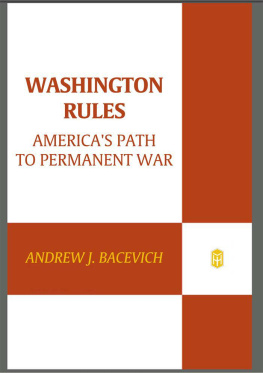
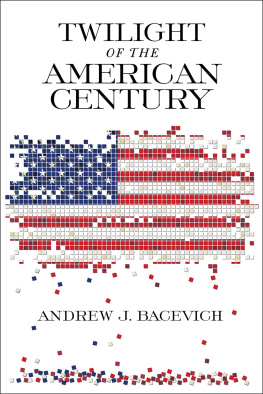
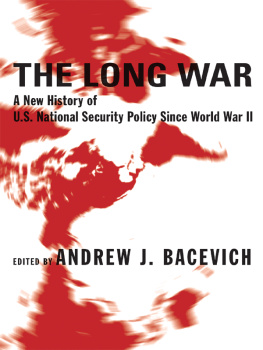

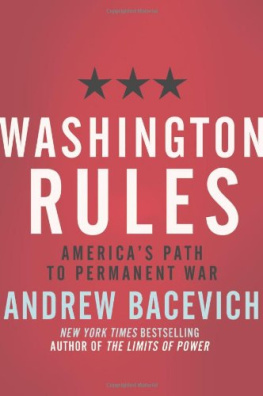
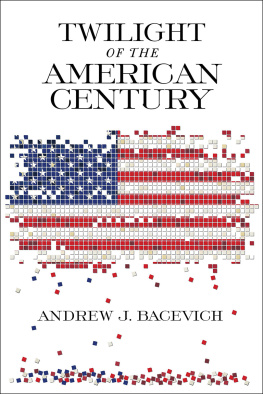
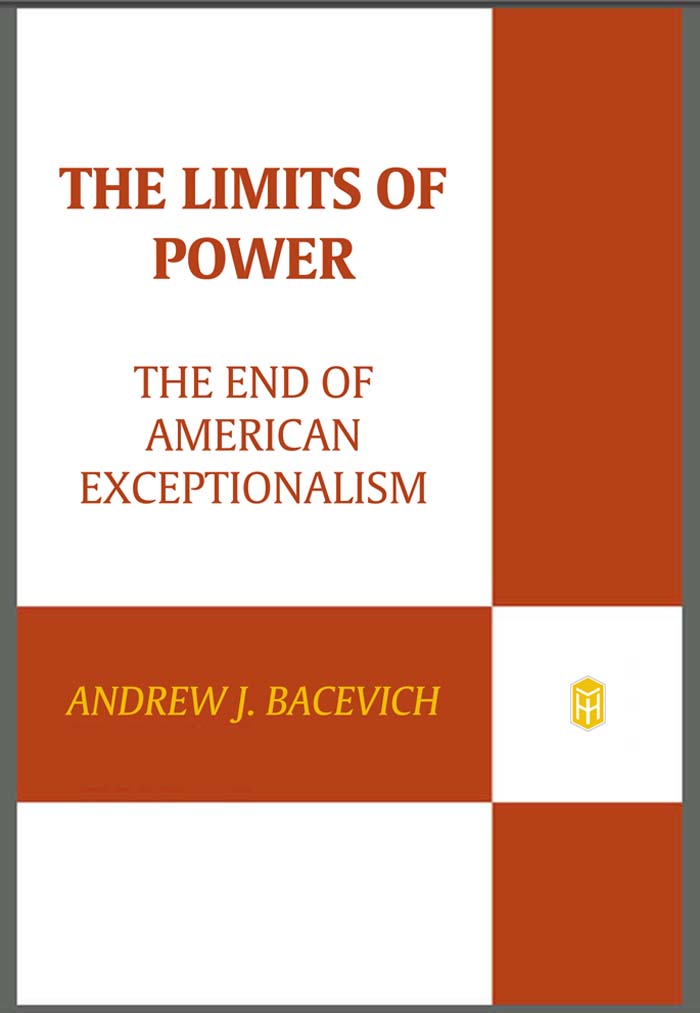

 are registered trademarks
are registered trademarks